- Home
- Sherwood Smith
The Fox Page 3
The Fox Read online
Page 3
He leaned over the rail, miming an overhand throw. A sinuous flick of silvery tail, and the mer vanished below the shifting layer of light.
Jeje felt the urge to kick him overboard, then regretted it. The boys were new hires. This was their first cruise as marines—they hadn’t lived with Inda and Tau for five years, ever since they were ship rats, as Jeje had.
Every reminder ripped like a splinter straight into her heart.
The youngest of her crew, Nugget, called from above, her voice like the cry of a bird. “What did you see?”
“Merfolk,” the boy yelled back, pointing to the now-empty waters. “Spying on us.”
“They’re just mers,” Nugget scoffed.
“When we were little they used to follow our fish boats. We used to drop rocks we carried special to drive them away. So they wouldn’t try to drag us into the deeps.”
“They’re curious. Not wicked.” Jeje had also spent her childhood aboard fishing boats. She kept her voice even, though it was a struggle. “My ma told me only the young ones spy on us. The older ones don’t bother with air-breathers. ”
The boy perched on the rail, his snub nose wrinkled. “But all the songs ’t home say they take you down into the deeps if they catch you.”
Jeje snorted. “Most songs are a lot of dream-kiting, my granny says.”
“So what’s true?”
“That they get you only if you go overboard in a storm or you’re thrown over by pirates or something.”
“So they drown people?”
Jeje shook her head. A cross sea smacked them amidships, dashing up a cool lacework of spray into their faces. That meant another wind change. “I dunno. Nobody ever comes back to say whether they were drowned or taken down and given a tail instead of legs. Me, I don’t care. Either way, you lose your life, at least the one you know.”
A flicker on the edge of her vision made her blink. A cold wash of worry snapped her upright, tension pounding in her forehead. “Look there!”
A shaft of sunlight splashed fiery white drops of liquid light over the top of the water, and this time it did not vanish, but broadened slowly. The fog gleamed in the sun as it dissipated. Jeje turned her head up to the masthead, where Nugget had perched precariously since dawn. “See anything? ”
“Swirls of fog. It’s almost lifting,” Nugget called down. “Oh!” she added as a puff of breeze sent the vapors whorling. Thinner . . . thinner . . . another gust of wind, and—
And . . . the sea was clear.
“Nothing anywhere,” Nugget shouted joyfully.
Tension released its merciless grip on Jeje’s neck, but her jaw still ached and her skull rang. So no one was hiding in the fog with bow drawn, but that left Inda and the others fighting . . . how many pirate ships against the two last traders?
“You can come on down now, Nugget, and fix yourself some grub. Watch change!” she yelled.
The older brother popped through the single hatch and leaped onto the deck, pausing only to ruffle Nugget’s tangled, butter-colored curls as she scrambled down.
“We’re still under orders to fetch help. Take over, same course,” Jeje said. “Keep us as taut as can be.”
She waited until he’d gripped the humming tiller in its sling—the wind was picking up again, sending them shooting forward over swelling white tops—and she moved forward to where Testhy, the last of her crew, crouched in the shaded coop they jokingly called the forecastle, poring over his charts. All that was visible were his thin, habitually hunched shoulders and his rusty-tinged pale hair, usually braided neatly but now scruffy. Testhy, like Inda, was left over from their early days on the Pim trader, but he’d been in another watch and Jeje didn’t know him well.
“Any idea where we are?” she asked, brushing her short dark hair out of her eyes. An image flickered in her mind— she had to look at least as scruffy as Testhy—to be followed within a heartbeat by her usual indifference to such matters.
What was far more important: nobody (except the Venn) dared ever sail more than a day, or perhaps two if you were desperate, away from any coast; navigation was by sun, chart, and landmark.
Testhy frowned over his markers. He needed the steadying influence of indisputable facts before he could trust himself to speak. “Sun’s where I wanted it to be, so we’re proximate, running north-northwest. If we don’t spot any sail who can fix our place, we need a land sighting.” He touched the detailed coastline above Lands End.
Jeje looked down at the beautiful chart, hearing Inda’s voice, I don’t care if the Vixen is always going to be around us, I think they still need maps. Uh, charts. He’d corrected himself fast, but not before everyone laughed. Maps! Even after five years, he slipped into landrat lingo.
Maps. Her heart constricted as she remembered that terrible fleet of pirates closing on the convoy. Inda. Tau. She forced the memory away and bent over the expensive chart. “Sail,” she said. “Too much to hope we’ll find some independent fleet that might be able to help us.”
Testhy stated the obvious in his precise way: “Only ones can rise against big pirate fleets, much less Brotherhood, is the kind of fleet kings put up.”
“So it’ll have to be Khanerenth’s royal fleet,” Jeje said uneasily. She hated the thought of dealing with warships. But she was under orders.
Testhy jerked his shoulders up in his characteristic shrug. “They’re spread too thin to heed much beyond their own shoreline is what I heard in Freeport Harbor.”
“Maybe they’ll heed us. Let’s grab some rest. While we can.”
The cry came from on deck. “Land ahead!”
The sun was sinking beyond the distant rough line of land, outlining it admirably for the navigator. Testhy splashed water on his face, then studied the charts. Pride warmed him when he identified the land as Khanerenth— right outside Tchorchin Harbor.
“Sail ahead! Two, no, three! Big capital ships, from the rigging—hull-down, larbo’bow!”
Nugget scampered past, light as a cat, and leaped up onto the boom to peer out. Testhy and Jeje looked at one another in grim anticipation, then Jeje moved to the tiller to take over. Right now she had the wind, so if needed, she could escape. She reached for her glass.
Sunset fire rimmed the mountains, lighting up the tips of the masts and their sails, moving in stately and precise station. Definitely warships. Pirates rarely moved in exact station.
The ships gradually took shape: first the tall masts, their layers of triangular sails, and then the outline of big navy brigantines with the Khanerenth clover-and-crown on the foresail and pennant of the flagship.
“Signal,” Jeje said.
Up jerked the red flags—the worldwide signal for help.
In answer the blue flag then the white flowed up the flagship’s tall foremast: the scout craft’s chief to report aboard the flagship.
Testhy ducked into the cubby and reappeared, the charts rolled under his arm. “Shall we both go?”
Jeje frowned. Testhy seldom met anyone’s eyes—it had been a couple of years, Jeje had realized once, before she discovered his were blue. He was just that way. But his manner was furtive as scraped his two front teeth over his chapped bottom lip.
“All right.” She wished, as she had all night, that the crew rotation hadn’t put her with Testhy; she longed for Rig, or Dasta, and especially for Thog, daughter of Pirog.
The mental image of Thog’s round, flat Chwahir face made her heart squeeze again. She turned away, as if she could physically escape emotional pain, and that made her think of Inda, and the way he used to twitch or jerk to escape what they figured had to be bad memory.
Inda, Thog, Dasta, Rig. Tau. Taken by pirates. Or killed by pirates.
She gripped the tiller.
They guided the Vixen around and under the lee of the flagship, smooth as a cygnet.
The sailors on duty aboard the warship watched with interest as the crew of what looked like mostly children loosened sail on the scout. As it drew near, a susu
rrus of comment passed from the top hands to the deck crew at the sight of the arrow-spiked hull and the merciless scoring of burn marks.
The two who climbed swiftly aboard wore no uniform nor did they dress flash, like pirates. The taller one, a youngish fellow with rusty-pale hair, deferred to the shorter one carrying ship papers: a young woman in plain sailor’s smock and summer deck trousers, her face brown, her body boyish in shape—strong shoulders, narrow hips. What kind of fight had they escaped?
Testhy and Jeje politely flicked their foreheads in salute to the captain.
“Who are you and what aid do you seek?” the captain said in Dock Talk.
Jeje hesitated, studying the tall, thin young captain. Hair worn back in a four-strand sailor’s queue, a good sign: the politically appointed landsmen captains usually wore their hair in land fashions and were worthless to a man or woman, in Jeje’s liberal opinion.
“Jeje sa Jeje, chief of Vixen, scout for our current hire, four ships out of Sarendan, Drapers Guild owners, carrying cotton-silk and other cloth goods up to Jabreis. Attacked by pirates.”
Heavy brows furrowed. “Brotherhood?”
“No. But it’s a big fleet. Three big raffees, one old trysail, at least six schooners, some sloops.”
“Tops’l?”
“Blank.”
The wind brought a mutter from one of the bowmen in the mizzen-top, “No wonder we seen no one for nigh three days.”
The captain glanced over the rail at his two consorts, then at his first lieutenant, who grinned with anticipation. “Sounds very like Gaffer Walic’s fleet. For that we’ll need reinforcement.” He scanned the darkening sky, sniffed the wind. “If we bustle we can catch the tide. Follow us into port.”
Jeje and Testhy scrambled back down into the Vixen and followed the navy ships into Tchorchin Harbor. Clouds tumbled upward in the northeast, sending gusts of wind slamming into their sails; the tide was making as well. Just before midnight bells they glided in, the Vixen rating that rarity, a mooring at the wharf, alongside the naval craft.
“You’re now chief mate,” Jeje said to Loos, the older of the Fisher brothers.
Nugget waited until Jeje and Testhy reached the shore, then helped herself to the little pile of coins kept in the chart cubby and jumped onto the dock.
“Hey,” cried the new chief. “Come back! She didn’t say liberty.”
“She didn’t say no, either. If anything’s open I want to find some cinnamon rolls as good as Rig’s. If I do I’ll get enough for all of us,” Nugget called back.
Leaving the would-be chief sighing as he thought, So much for command.
Testhy and Jeje followed the first lieutenant, stumbling with exhaustion and clumsy efforts to regain land balance. Testhy felt as if the brick promenade leading to the harbormaster’s huge, castellated building was moving with a slow roll, and his knees had gone watery.
Jeje picked up on his tension without knowing the reason, but she was too tired to remark on it as the first spatters of a rainsquall splashed warmly on their faces.
The harbormaster was a tough old woman who reminded Jeje at once of her grandmother on the other end of the continent. She felt her spirits lift, a relief that vanished as the questioning went on far too long. When did the atmosphere change? She was only aware of it when the harbormaster said, “The matter will be dealt with,” and dismissed them with a cold-eyed nod.
Testhy had been watching the scribe in the far corner, who’d signaled something to the harbormaster when Jeje gave the names of their three marine leaders: Handar Kodl, Fussef Niz Findl, and Inda Elgar.
Ryala Pim was here, Testhy thought as they followed a runner to a small anteroom. Reported us as pirates who stole her ships, like she said she would.
They’d scarcely sat down on the worn benches outside the harbormaster’s office when, to their surprise, the first lieutenant returned with a furtive air.
He was short, fair, and looked very much younger than he had on deck—Dasta’s age, or maybe even Inda’s. He jerked a thumb toward the door. “Cap’n sent me to say you better hop.”
“What?” Jeje gasped.
The lieutenant’s Dock Talk was staccato, hard to follow, as he motioned to Jeje. He snapped open a scrolled order and flicked one finger over the seal at the bottom, which had the faint glitter of magic attesting to its being genuine: a sved. Used all over the maritime world, the term had come to mean truth. “Here’s the sved on your people. Your name isn’t in the arrest-on-sight book. She won’t grab you if you hop. Two o’ your marine captains and one other fellow are listed. Not the Delf. The main one is that lord.”
Jeje looked from one to the other. “Lord?” she asked again, more weakly, because she didn’t see question in Testhy’s face, but a scowling comprehension.
The lieutenant saw it too, and said to him, “The captain said he heard about your marine band. Good rep on the seas. But you have to understand, the new king wants no trouble with the Venn. That Marlovan lord. Elgar, I think the name was? He’s on the capital list for theft of three ships, alongside o’ some Iascan fellow, Handar something—”
“Kodl?” Jeje squeaked.
“That was it. And some Toaran with a name that sounded like a snake’s hiss.”
Testhy did not offer his name.
“Charge made by a shipowner out west—”
“Ryala Pim,” Testhy said in a low voice.
“That was the name! Anyway, if we were to rescue them, especially the Marlovan lord, and word got out, and it does when anything happens with those names on the capital lists, the Venn will call us treaty breakers. Nobody can stand against them, especially not us. We’re trying to recover from losing half the navy a few years ago, but even back then we wouldn’t have been able to stand against them.”
“So what you are telling me is that because of this accusation, which is a lie, you have to call Inda and Kodl and the rest of us pirates?”
“Cap’n knows you aren’t pirates. But not the landsmen. All they know is this Pim is a member of the Shipowners’ Guild in good standing—or at least was until our own troubles here, when we had a couple years’ break in the records. So we have to take her accusation seriously, and that means treat anyone whose name is on that list like a pirate, yes, until either the name goes off the list, or he’s reported dead. If we catch the Marlovan lord in particular and turn him over to the Venn—he being Marlovan, and the Venn are at war with them—it means Venn aid on the seas. We need it.” And, at Testhy’s white-lipped glare, he added, “It’s become a political decision, see?”
Jeje said numbly, “You won’t go after those pirates?”
“Can’t send a rescue,” the lieutenant said, shaking his head. “Only a war fleet. We can’t rescue pirates fighting pirates. Especially a big fleet like Gaffer Walic’s. It would take most of our navy to find and fight him. Then all pirates on both sides get it.” He drew his finger across his neck.
“But your captain knows we’re not pirates, we’re marines, on a legitimate hire.”
“Except the names of your commanders are on the capital list.” Voices outside in the hall caused the lieutenant to jerk around. “Look, I gotta run, and you better, too.”
“Wait,” Jeje said, and the young man looked back warily. “This Gaffer Walic. Does he follow Brotherhood custom? Kill ships?”
He grimaced. “Sometimes. Though word is he’s been on the recruit. Building a fleet. He wants into the Brotherhood, which means he has to win a big action. That means taking on good ships and crew.” He slipped out and shut the door.
“Then they might be alive. But what’s all that about lords?” Jeje asked. She wanted to stomp and smash everything in sight. “That part makes no sense!”
“I’ll explain, but not here,” Testhy said.
Jeje nodded, heartsick and weary.
Testhy led the way into a narrow stone warren of streets.
Questions surged about in Jeje’s head like flotsam on high tide, nothing reassembling
into answers.
Rain, sudden and warm, shocked her into awareness of her surroundings. They passed the glowglobe-lit official buildings (many still under construction from the burnings of the last civil war) to the older shops and eateries and doss-houses used by the seagoing trade. It was so late most shops were closed up, but light emanated from a low-roofed sailors’ place—the sign bore a crudely painted schooner on the side of a beer mug—at an intersection lit by hanging lanterns.
The stuffy interior smelled of brine, sweat, stale beer, and boiled cabbage, a tang too familiar in every port they’d ever visited to be noticed. Testhy, still shocked at how close he had come to being arrested—or maybe killed, or given over to the Venn—plopped into a chair at a corner table near an open window, where they could see the door and the other patrons, and where they had a second exit; so much of Inda’s training had become habit. He thrust trembling fingers through his hair to his scalp, pressing hard as if to hold his head together. And some Toaran with a name that sounded like a snake’s hiss. His breath chuffed out.
“Talk,” Jeje said low-voiced, in Iascan.
Testhy had learned that language over the past five years. “Inda is a Marlovan. Son of a prince. Ryala Pim showed up at Freeport Harbor right after we were on the Dancy, remember? About to winter over?”
Jeje nodded. “And you didn’t tell any of us?”
“Kodl ordered us not to. Said Inda didn’t want anyone to know. Didn’t make any difference any way I could see, so I forgot about it. Anyway, she accused us all of being pirates. Wouldn’t listen, accused us of Leugre’s mutiny! Demanded the money for her ships. Then when Inda tried talkin’ sved, she spouted all that—even said his real name—and some gabble about how some other Marlovan had accused him of being a coward or killing some other boy or something, where those Marlovans do their war training when they’re young. Didn’t make any sense. What did make sense was the threat Ryala Pim made: she was going to report us in every harbor. And then she disappeared—by magic token!” He snapped his fingers. “Like that!” He scowled. “We saw her signed-sealed sved today. She musta reported us right here, in this harbor.” He jerked his thumb down at the unswept floor.

 Inda
Inda Danse De La Folie
Danse De La Folie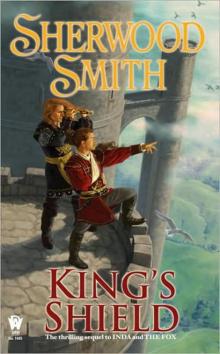 King's Shield
King's Shield Whispered Magics
Whispered Magics Fleeing Peace
Fleeing Peace Barefoot Pirate
Barefoot Pirate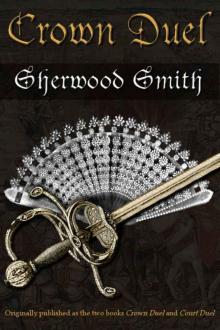 Crown Duel
Crown Duel Mearsies Heili Bounces Back
Mearsies Heili Bounces Back Commando Bats
Commando Bats A Stranger to Command
A Stranger to Command Lhind the Spy
Lhind the Spy The Spy Princess
The Spy Princess Blood Spirits
Blood Spirits Sasharia en Garde
Sasharia en Garde Lhind the Thief
Lhind the Thief Paradise Drift
Paradise Drift Banner of the Damned
Banner of the Damned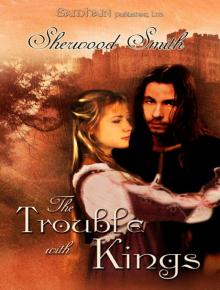 The Trouble With Kings
The Trouble With Kings Poor World
Poor World Treason's Shore
Treason's Shore Wren Journeymage
Wren Journeymage A Posse of Princesses
A Posse of Princesses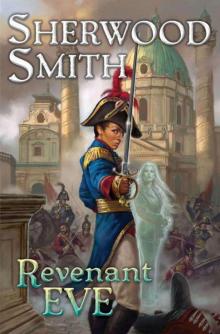 Revenant Eve
Revenant Eve Once a Princess
Once a Princess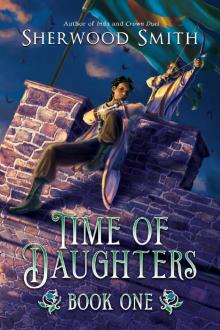 Time of Daughters I
Time of Daughters I Rondo Allegro
Rondo Allegro Coronets and Steel
Coronets and Steel Over the Sea
Over the Sea Senrid
Senrid Hunt Across Worlds
Hunt Across Worlds A Sword Named Truth
A Sword Named Truth The Fox
The Fox Twice a Prince
Twice a Prince Fair Winds and Homeward Sail: Sophy Croft's Story
Fair Winds and Homeward Sail: Sophy Croft's Story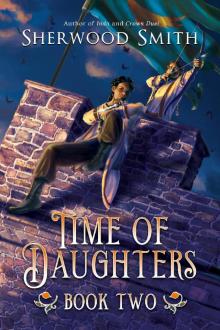 Time of Daughters II
Time of Daughters II The Rifter's Covenant
The Rifter's Covenant The Phoenix in Flight
The Phoenix in Flight Stranger
Stranger The Thrones of Kronos
The Thrones of Kronos A Prison Unsought
A Prison Unsought Twice a Prince: Sasharia En Garde Book 2
Twice a Prince: Sasharia En Garde Book 2